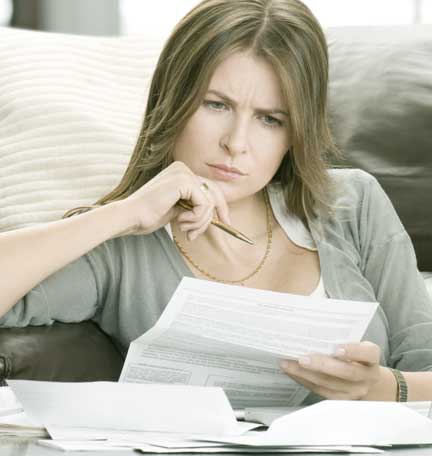Following these simple steps can help you pay off debt.
1. Stop Borrowing and Stop Spending
You can't borrow your way out of debt. As soon as you stop spending more than you earn, you're already one step closer to reducing your debt.
2. Outline How Much You Owe
List all the creditors you carry a balance with and note for each account how much you owe, the minimum monthly payment, the interest rate, and any fees. Then total all of your debt. Taking a big picture view of your debt will make it clear how much you owe in total and allow you to start thinking of ways to decrease your debt burden. For instance, if you're making monthly payments on multiple high-interest credit cards, you may want to consider consolidating that debt into a single lower-interest loan. This strategy may reduce the amount of interest you accumulate each month and thereby allow you to effectively put more money toward paying off the principal balance.
3. Develop a Workable Budget
Start by listing all the bills you pay each month, including rent or mortgage payments, utilities, and any other set expenses that rarely change from month-to-month. Then list the other necessities that do vary based on your spending habits, such as groceries, gas and cell phone bills. When you're creating your budget, look for ways to cut back on these expenses, including buying non-perishable goods in bulk or carpooling to work. Then list the unnecessary items you purchase regularly, such as your morning coffee at a gourmet shop or your weekly magazine. Reducing your daily spending, even in little ways, can add up quickly. For example, shaving just $4 from your daily expenses by skipping the gourmet coffee adds up to more than $1,400 over the course of a year. That little bit—when combined with other efforts—can go a long way to helping you pay off your debt.
4. Make a Payment Plan
Once you have created a clear monthly budget, figure out how much of your remaining income you can afford to put toward your debt each month. Then commit to making those payments, even if that means missing out on a summer concert or clearance sale. Use our online debt calculator to determine how long it will take you to pay off your debt based on your target monthly payments. If you can make more than the minimum required payment each month, do so. This may go a long way toward reducing the amount of interest you pay over time.
5. Contact Your Creditors
If you think you won't be able to make a payment, contact your lenders or creditors and request to make an alternate payment arrangement. Don't wait until you're behind on your payments to contact them to tell then you're having financial problems. Creditors and lenders often work with borrowers, and you may have more options available if you get in touch with them sooner rather than later.
6. Keep a Close Eye on Your Loans
Your auto and home loans are secured loans, which means that with a particular asset secures the debt and could be repossessed in the event of a default. If you stop making payments on these loans for whatever reason, lenders may be entitled to repossess your car or foreclose on your house.
If you aren't able to make car payments and fear that you will default, it may be better to ask your auto loan creditor about options other than repossession such as the creditor selling the car, as repossession may result in a blemish on your credit report.
As soon as you think you may you fall behind on your house payments, contact your mortgage lender right away. Mortgage lenders sometimes work with homeowners in good faith, perhaps by reducing payments for a set period of time or even suspending payments temporarily.





